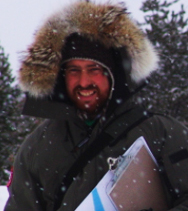| People |
| Nicolas Brunet, Ph.D.
B.Sc. Agricultural and Environmental Sciences (2003) McGill University; M.Sc. Rural Planning and Development (2006) University of Guelph, Canada; Ph.D. (Renewable Resources), McGill University (2014).
|
|
Ph.D. Thesis:
ASSESSING STAKEHOLDER PARTICIPATION IN NORTHERN SCIENTIFIC RESEARCH
Abstract
Many researchers have claimed that Northern science has experienced a paradigm shift which includes an increased emphasis on local community engagement. However, very few studies have empirically examined this claim. This thesis seeks to better understand and explore stakeholder participation in Northern science to inform research policy and practice, primarily in Canada. The shift towards a greater emphasis on local community engagement in Northern science fits within a broader transition that has been observed in international research policy, described by Gibbons et al. (1994) as a shift from Mode 1 (traditional forms of scientific discovery) to Mode 2 (knowledge generated in the context of application) approaches to knowledge production. Using this framework to analyze research articles published between 1960 and 2010 in four prominent Arctic and polar-focused journals, we identify that shifts toward Mode 2 research approaches over time have been modest and gradual, and that Mode 1 forms of knowledge production continue to dominate Northern science. Local involvement in research appears to vary systematically among disciplines, organizations and regions, raising important questions for research and policy. Recognizing that claims of a new Northern research paradigm have been coupled with growing levels of dissatisfaction with research activities within many Northern indigenous communities, there is a need to better understand the factors that enable and limit research partnership development as well as the associated outcomes. Using a single in-depth case study analysis of a successful research partnership of an International Polar Year program in a remote northern Yukon community, it was revealed that certain contextual and procedural aspects were associated with positive outcomes. The procedural aspects included early engagement in the research design or even proposal-writing process which was associated with decentralized control and power sharing. Important contextual elements included local research history and local decision making processes as well as local forms of reciprocity and trust, all identified as critical to building bridging social capital between researchers and communities. Building on these findings, a national survey of Northern research stakeholders revealed that contextual elements were generally considered more important than procedural considerations. More specifically, respondents indicated that research partnership success was more often depended on how and to what extent the social capital of stakeholders was bridged, often expressed as iii trust. Acknowledging the importance of the research context and inspired by the literature on research for development, a capital assets approach to conceptualizing and assessing partnership outcomes is proposed. Based on survey data, the potential for such a capital assets approach to improve our understanding of the transformative effects of scientific research partnerships on communities and researchers is discussed.
Project Publications:
Rahman, H.M.T., Saint Ville, A., Song, A.M., Po, J.Y.T., Berthet, E., Brammer, J.R., Brunet, N.D., Jayaprakash, L.G., Lowitt, K.N., Rastogi, A., Reed, G. and Hickey, G.M. (2017). A framework for analyzing institutional gaps in natural resource governance. International Journal of the Commons 11(2): 823–853.
Brunet, N.D., Hickey, G.M. and Humphries, M.M. (2017). How can research partnerships better support local development? Stakeholder perceptions on an approach to understanding research partnership outcomes in the Canadian Arctic. Polar Record 53(5): 479-488.
Brunet, N.D., Hickey, G.M. and Humphries, M.M. (2016). Local participation and partnership development in Canada’s Arctic research: Challenges and opportunities in an age of empowerment and self-determination. Polar Record 52(3): 345-359.
Brunet, N.D., Hickey, G.M. and Humphries, M.M. (2014). Understanding community-researcher partnerships in the natural sciences: A case study from the Arctic. Journal of Rural Studies 36: 247-261.
Brunet, N.D., Hickey, G.M. and Humphries, M.M. (2014). The evolution of local participation and the mode of knowledge production in Arctic research. Ecology & Society 19(2): 69. [online]
Hickey, G.M., Brunet, N. and Allan, N. (2010). A constant comparison of the Environmental Assessment legislation in Canada. Journal of Environmental Policy & Planning 12(3): 315-329
| <<Back |
